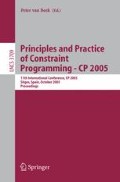Abstract
In manufacturing scheduling, jobs may have uncertain earliest start times, caused by supplier lead-time uncertainty. How should we build initial schedules to be robust to these uncertain release dates? We are attempting to adapt the online decision making methods from [1] in particular the expectation and consensus methods, which combine sampling of future scenarios with deterministic optimization.
First, we assume that we have a probability distribution over the release dates, and we use this to select samples, giving them a weight proportional to their probability, which we use when determining the best decision. For expectation, we consider all possible partial schedules of released jobs up to the earliest possible uncertain release date (t 0), for each sample extend each partial schedule, and return the one with the lowest expected makespan. For consensus, we find the optimal decision for each sample, and then choose the one with the highest sum of weights. We consider three possible types of initial decision: (i) partial schedules up to t 0; (ii) independent resource assignments for a single time step; and (iii) a tuple of resource assignments for a single time step. The latter two require re-optimization at each time-step up to t 0.
We have implemented the above in Ilog Scheduler 6.0, and tested them on modified JSP benchmarks [2]. The experiments show that our four adapted methods all provide good results (i.e. weighted relative error not being more than 2%). However, it is also possible to get close to the optimal without reasoning about the uncertain events in advance (e.g. using pure reactive methods). The problems appear to be too easy, and not sensitive to the uncertainties. Future work will investigate why this is the case, to determine the features that do make the problems sensitive to the uncertainty in the release dates.
funded by Enterprise Ireland (SC/2003/81), with support from Science Foundation Ireland (00/PI.1/C075) and ILOG, S.A.
Access this chapter
Tax calculation will be finalised at checkout
Purchases are for personal use only
References
Bent, R., Van Hentenryck, P.: The Value of Consensus in Online Stochastic Scheduling. In: Proceedings of the Fourteenth International Conference on Automated Planning and Scheduling (2004)
Lawrence, S.: Resource constrained project scheduling: an experimental investigation of heuristic scheduling techniques (Supplement), Graduate School of Industrial Administration, Carnegie-Mellon University, Pittsburgh, Pennsylvania (1984)
Author information
Authors and Affiliations
Editor information
Editors and Affiliations
Rights and permissions
Copyright information
© 2005 Springer-Verlag Berlin Heidelberg
About this paper
Cite this paper
Wu, C.W., Brown, K.N., Beck, J.C. (2005). Scheduling with Uncertain Start Dates. In: van Beek, P. (eds) Principles and Practice of Constraint Programming - CP 2005. CP 2005. Lecture Notes in Computer Science, vol 3709. Springer, Berlin, Heidelberg. https://doi.org/10.1007/11564751_110
Download citation
DOI: https://doi.org/10.1007/11564751_110
Publisher Name: Springer, Berlin, Heidelberg
Print ISBN: 978-3-540-29238-8
Online ISBN: 978-3-540-32050-0
eBook Packages: Computer ScienceComputer Science (R0)

